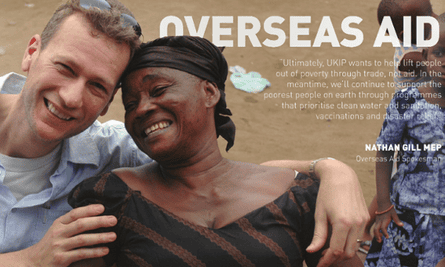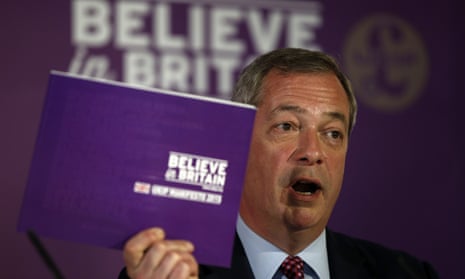The UK Independence Party (Ukip) has pledged to slash Britain’s overseas aid spending by more than two-thirds and abolish the “wasteful” Department for International Development (DfID) if it wins next month’s general election.
In its manifesto, which was published on Wednesday, Ukip argues that “charity begins at home” and attacks the Conservatives, Liberal Democrats and Labour party for supporting recent legislation that commits the UK to spending 0.7% of its annual gross national income on international aid.
The party objects to the ringfencing of the aid budget at a time when “the politics of austerity” have left hundreds of thousands of Britons reliant on food banks, pensioners “freezing to death” because of rising fuel bills, and the NHS under severe strain.
“The old parties pushed ahead with this expenditure regardless, ignoring considerable evidence that the money spent on overseas aid is not well directed or controlled and that much is wasted, lost to corruption or handed to countries already wealthy enough to have their own space programmes, nuclear weapons and even overseas aid programmes of their own,” says the manifesto.
Taxpayers’ money, it adds, should not be spent on “already economically thriving countries; countries with poor human rights’ records; and … on politically correct vanity projects that do nothing to lift developing nations out of poverty”.
Ukip intends to repeal the 0.7% commitment and bring the UK’s aid contributions in line with those of the US, which currently spends 0.2% of its national income on overseas aid.
The proposed changes would take place over three years to allow projects in progress to be completed and any contractual obligations to be met. Despite the huge reduction, however, Ukip says Britain’s overseas aid will not fall below £4bn a year – “more than given by Spain and Italy combined”.
Some of the manifesto’s harshest language – and plans – are reserved for DfID, which spent £11.46bn on overseas aid in 2013. Ukip wants to close the department, merging its “essential functions” with the Foreign and Commonwealth Office, but keep a single minister for overseas development.
“DfID has already shown itself to be wasteful and lacking in focus on aid outcomes, yet its budget has been protected from recent government cuts,” says the manifesto. “Ukip takes a very different view: when DfID’s budget is reduced, we see no reason to keep DIFD [sic] running as an independent government department.”
The party is also promising to refocus aid spending on emergency relief, healthcare, inoculation against preventable diseases and water and sanitation projects.

In reference to another of Ukip’s manifesto promises – to take the UK out of the EU – the party intends to offer British providers the first chance to run such programmes “following removal from the EU procurement directive”.
Once free of “the EU’s protectionism” – which Ukip claims has adversely affected international development – the UK will be better placed to help the world’s poorest people “by giving them free access to the British market”.
Ukip’s proposals were immediately criticised by the campaigning group Global Justice Now.
“It’s true that too much aid money is spent on consultants and free market privatisation schemes, but Ukip’s solution – simply to cut it massively – is a recipe for a more unequal world,” said the group’s director, Nick Dearden.
“If you’re concerned with making the world fairer, you support real redistribution of income from the richest to the poorest, you use this money to help build decent public services around the world.”
In their manifestos, the Tories, Labour and the Lib Dems have all promised to continue their support for the 0.7% commitment.
The Conservatives argue that aid is essential to both the UK’s interests and those of the developing world.
“Aid helps prevent failed states from becoming havens for terrorists,” says the Tory manifesto. “It builds long-term markets for our businesses, by promoting global prosperity, and reduces migration pressures. So we will maintain our commitment to tackling conflict, poverty and disease around the world.”
Labour is promising to rebalance the budget to target funding on the poorest countries in the world. The party would focus on working “in fragile and conflict-affected states to improve the lives of those affected by violence, prioritising the protection and education of women and children”, tackling corruption and improving tax systems and workers’ conditions.
The Liberal Democrats will work to fight climate change, prevent conflict, offer humanitarian aid, and promote trade, development and prosperity.
The Green party, meanwhile, goes much further than the Conservatives, the Liberal Democrats or Labour – and in the opposite direction to Ukip.
In its manifesto, the party pledges to increase the overseas aid budget from 0.7% of gross national income to 1% over the course of the next parliament, to fight for the cancellation of international debts to the poorest countries and to help less developed nations “fund climate change adaptation and build resilient communities through the UN Adaptation Fund”.
Plaid Cymru, which also supports the 0.7% legislation, says that “failure to assist the developing world will only fuel resentment, violence and division”. It intends to ensure international cooperation to prevent modern slavery and female genital mutilation, and to campaign to see more consideration given to the effects of climate change on poverty.
The Scottish National Party manifesto is not released until Monday.

Comments (…)
Sign in or create your Guardian account to join the discussion